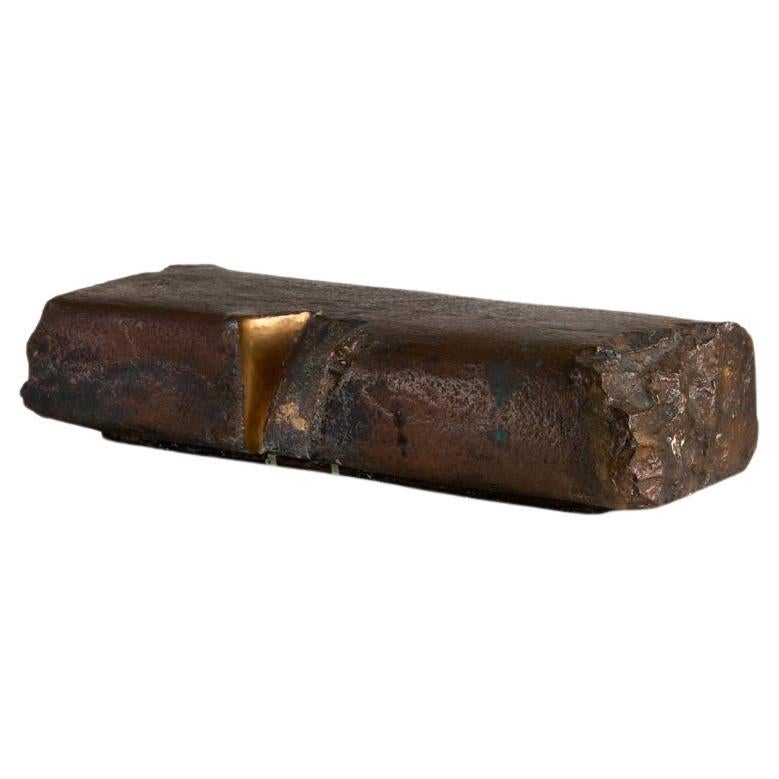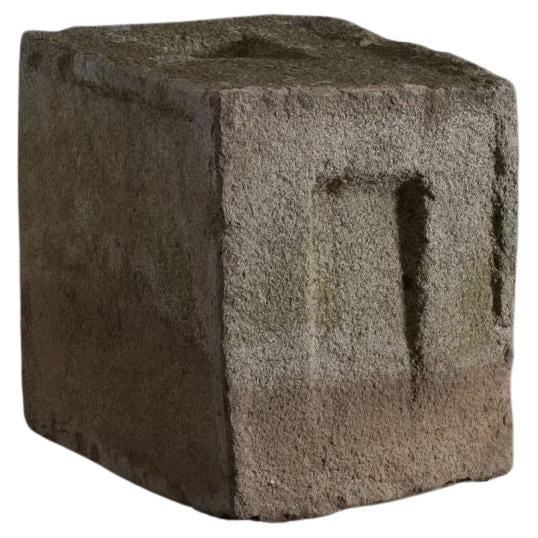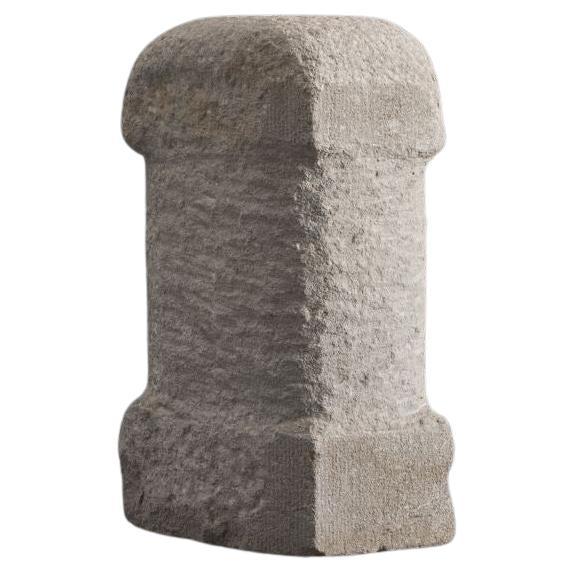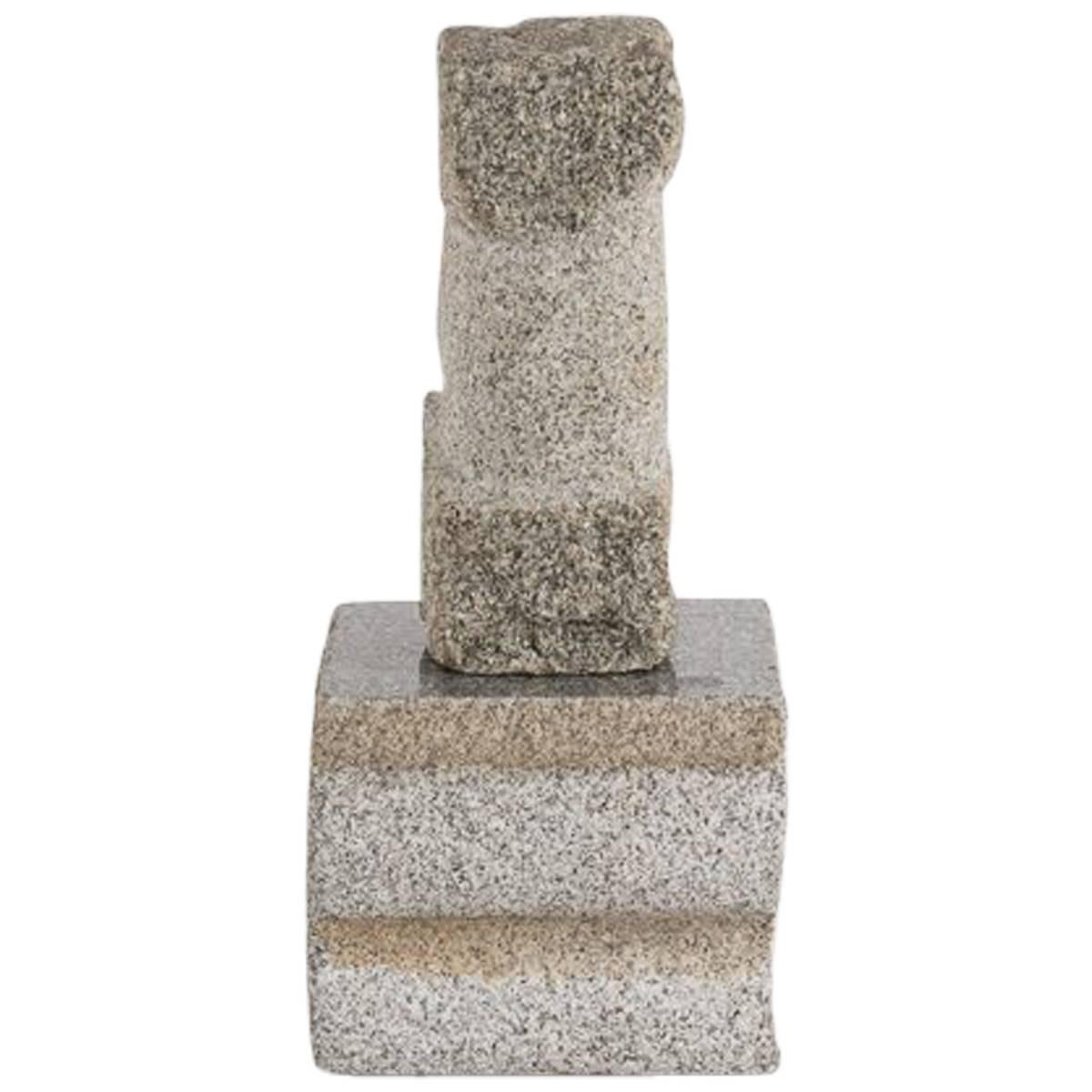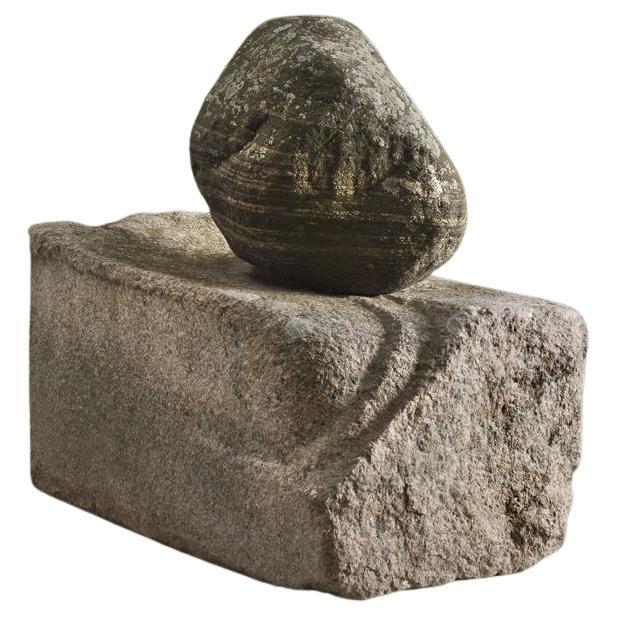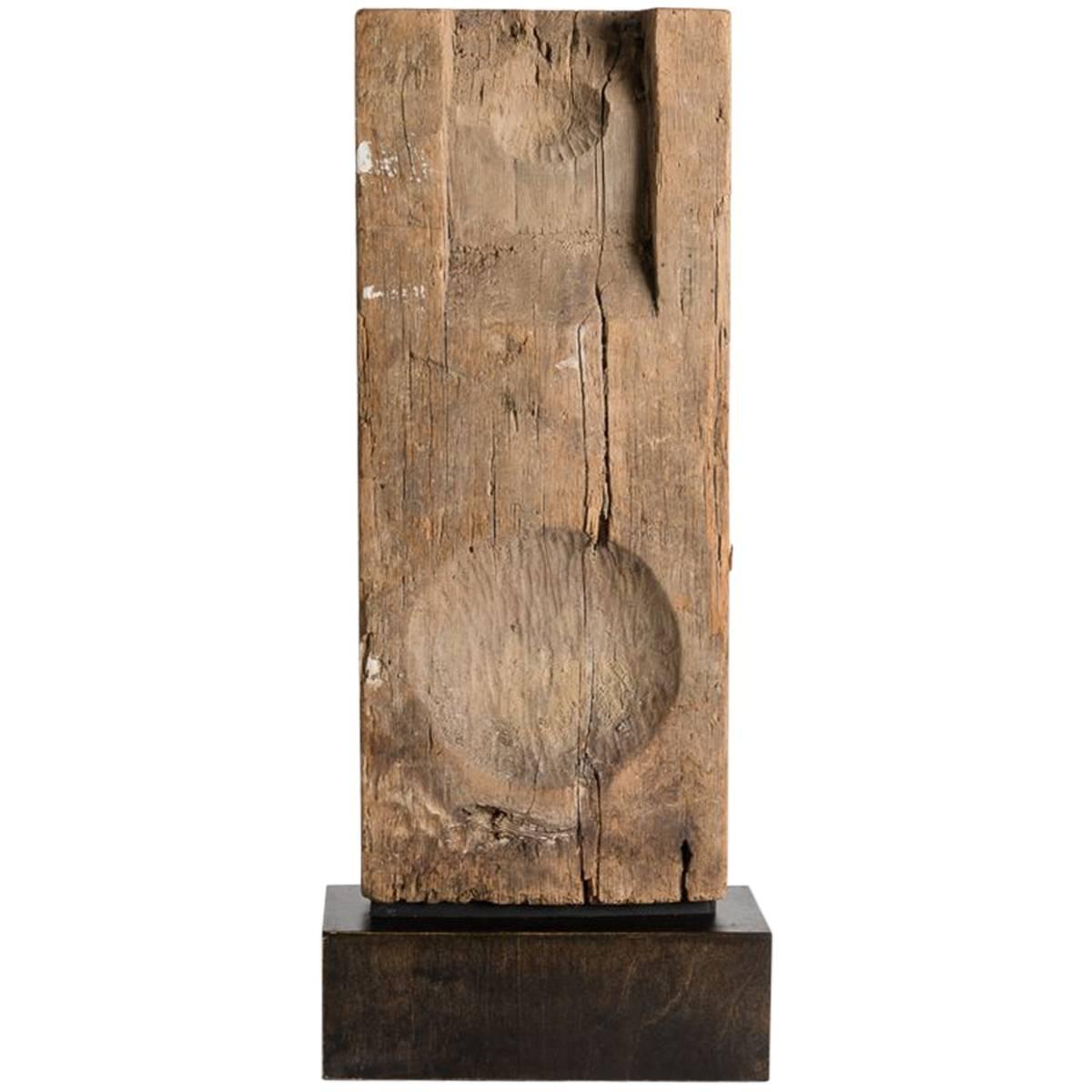Items Similar to Yongjin Han, Untitled, Sculpture in Pink Granite, United States
Want more images or videos?
Request additional images or videos from the seller
1 of 7
Yongjin Han, Untitled, Sculpture in Pink Granite, United States
About the Item
Yongjin Han was born in Seoul, South Korea in 1934. After the Korean War—in which he fought, lying about his age in order to enlist—he was one of six students admitted to the sculpture program at the Seoul National University. At the time of his enrollment little of his native city remained intact; nonetheless, he had never felt more responsible to his work, firm in the conviction that artistic expression is every bit as essential to life and human nature as eating, drinking, or breathing.
One of Han’s teachers was Kim Chong Yung, a pioneer of Korean abstract sculpture, and by the time of his graduation he had adopted the abstraction that had seized both Europe and the United States several years before. . In 1967 he relocated to the USA, where he studied at Dartmouth and Columbia. Over the course of his long career the artist returned to Korea with frequency and made extended stays in Japan and Europe.
Trips to Korea signified something more than mere homesickness: Han’s work, though made largely in America, remained grounded in his rich cultural heritage. Korea rests on a bedrock of granite, and freestanding sculpture produced of the stone has for centuries demarcated sites of historical and religious significance. Han’s sculpture bridges this past with modernity. Richard A. Born, former Curator at the Smart Museum at the University of Chicago, has said that Han “brought Korea’s tradition of direct stone carving out of figuration into a refined, non-objective abstraction.”
For his part, Han put very little stock in designations; his focus, instead, was on the stone itself. His pieces explore a certain harmonization with nature. Han, when describing his work, said, "As stone has been around since the beginning of time, it has much to teach us if we care to slow down and listen." He believed that each stone has its own history, character, and energy and that his task was to draw out these inherently spiritual qualities. He described his process as a “dialogue” with his material: "The stone tells me it has an itch in a certain spot, so I scratch it—and we both feel better!"
Han worked alone and with manual tools, and the process is arduous. Carving stone this way takes time, and, what’s more, required great force—yet Han’s sculptures, even the monumental ones, are, as friend and fellow artist David Parker says, “all gentle grace and warmth” … [the sculptor] “engages with the stone as an equal—like wayfarers meeting on a path, Han and a stone spend time together and when they part, both are marked and changed forever.”
Yongjin Han's career spanned decades and continents, and included several prestigious large-scale public commissions. In Seoul his work can be found at the National Museum of Contemporary Art, the IE Young Museum of Contemporary Art, the Whanki Museum, the Ewha Woman’s University Museum, Posong High School, and the 88 Olympics Seonsu Village. His sculptures are held in a variety of public and private collections throughout the world, notably by the Herning Kunst Museum in Denmark; the Smart Museum of Art, University of Chicago; and the Sculpture Park at City Hall, Redding, CA.
- Creator:Yongjin Han (Artist)
- Dimensions:Height: 10 in (25.4 cm)Width: 16 in (40.64 cm)Depth: 13 in (33.02 cm)
- Materials and Techniques:
- Place of Origin:
- Period:
- Date of Manufacture:Early 21st Century
- Condition:
- Seller Location:New York, NY
- Reference Number:
About the Seller
5.0
Recognized Seller
These prestigious sellers are industry leaders and represent the highest echelon for item quality and design.
Established in 1974
1stDibs seller since 2003
188 sales on 1stDibs
Typical response time: 10 hours
Associations
The Art and Antique Dealers League of America20th Century SpecialistsAntiques Associations Members
- ShippingRetrieving quote...Ships From: New York, NY
- Return PolicyThis item cannot be returned.
More From This SellerView All
- Yongjin Han, Untitled, Sculpture in Bronze, United States, 1996By Yongjin HanLocated in New York, NYYongjin Han was born in Seoul, South Korea in 1934. After the Korean War—in which he fought, lying about his age in order to enlist—he was one of six students admitted to the sculpture program at the Seoul National University. At the time of his enrollment little of his native city remained intact; nonetheless, he had never felt more responsible to his work, firm in the conviction that artistic expression is every bit as essential to life and human nature as eating, drinking, or breathing. One of Han’s teachers was Kim Chong Yung, a pioneer of Korean abstract sculpture, and by the time of his graduation he had adopted the abstraction that had seized both Europe and the United States several years before. . In 1967 he relocated to the USA, where he studied at Dartmouth and Columbia. Over the course of his long career the artist returned to Korea with frequency and made extended stays in Japan and Europe. Trips to Korea signified something more than mere homesickness: Han’s work, though made largely in America, remained grounded in his rich cultural heritage. Korea rests on a bedrock of granite, and freestanding sculpture produced of the stone has for centuries demarcated sites of historical and religious significance. Han’s sculpture bridges this past with modernity. Richard A. Born, former Curator at the Smart Museum at the University of Chicago, has said that Han “brought Korea’s tradition of direct stone carving out of figuration into a refined, non-objective abstraction.” For his part, Han put very little stock in designations; his focus, instead, was on the stone itself. His pieces explore a certain harmonization with nature. Han, when describing his work, said, "As stone has been around since the beginning of time, it has much to teach us if we care to slow down and listen." He believed that each stone has its own history, character, and energy and that his task was to draw out these inherently spiritual qualities. He described his process as a “dialogue” with his material: "The stone tells me it has an itch in a certain spot, so I scratch it—and we both feel better!" Han worked alone and with manual tools, and the process is arduous. Carving stone this way takes time, and, what’s more, required great force—yet Han’s sculptures, even the monumental ones, are, as friend and fellow artist David Parker says, “all gentle grace and warmth” … [the sculptor] “engages with the stone as an equal—like wayfarers meeting on a path, Han and a stone spend time together and when they part, both are marked and changed forever.” Yongjin Han's career spanned decades and continents, and included several prestigious large-scale public commissions. In Seoul his work can be found at the National Museum of Contemporary Art, the IE Young Museum of Contemporary Art, the Whanki Museum, the Ewha Woman’s University Museum, Posong High School, and the 88 Olympics...Category
21st Century and Contemporary American Abstract Sculptures
MaterialsBronze
- Yongjin Han, A Piece of Stone, Granite Sculpture, United States, c. 1984By Yongjin HanLocated in New York, NYYongjin Han was born in Seoul, South Korea in 1934. After the Korean War—in which he fought, lying about his age in order to enlist—he was one of six students admitted to the sculptu...Category
Vintage 1980s American Abstract Sculptures
MaterialsGranite
- Yongjin Han, A Piece of Stone, Granite Sculpture, United States, 1993By Yongjin HanLocated in New York, NYYongjin Han was born in Seoul, South Korea in 1934. After the Korean War—in which he fought, lying about his age in order to enlist—he was one of six students admitted to the sculptu...Category
1990s American Abstract Sculptures
MaterialsGranite
- Yongjin Han, Two Pieces of Granite, Sculpture, United States, 2005By Yongjin HanLocated in New York, NYTwo pieces of granite, a sculpture by Korean-American artist Yongjin Han.Category
21st Century and Contemporary American Abstract Sculptures
MaterialsGranite
- Yongjin Han, Two Pieces of Stone, Granite Sculpture, United States, 1993By Yongjin HanLocated in New York, NYYongjin Han was born in Seoul, South Korea in 1934. After the Korean War—in which he fought, lying about his age in order to enlist—he was one of six students admitted to the sculptu...Category
1990s American Abstract Sculptures
MaterialsGranite
- Yongjin Han, Piece of Wood, Sculpture, United States, 1976By Yongjin HanLocated in New York, NYYongjin Han was born in Seoul, South Korea in 1934. After the Korean War—in which he fought, lying about his age in order to enlist—he was one of six students admitted to the sculpture program at the Seoul National University. At the time of his enrollment little of his native city remained intact; nonetheless, he had never felt more responsible to his work, firm in the conviction that artistic expression is every bit as essential to life and human nature as eating, drinking, or breathing. One of Han’s teachers was Kim Chong Yung, a pioneer of Korean abstract sculpture, and by the time of his graduation he had adopted the abstraction that had seized both Europe and the United States several years before. . In 1967 he relocated to the USA, where he studied at Dartmouth and Columbia. Over the course of his long career the artist returned to Korea with frequency and made extended stays in Japan and Europe. Trips to Korea signified something more than mere homesickness: Han’s work, though made largely in America, remained grounded in his rich cultural heritage. Korea rests on a bedrock of granite, and freestanding sculpture produced of the stone has for centuries demarcated sites of historical and religious significance. Han’s sculpture bridges this past with modernity. Richard A. Born, former Curator at the Smart Museum at the University of Chicago, has said that Han “brought Korea’s tradition of direct stone carving out of figuration into a refined, non-objective abstraction.” For his part, Han put very little stock in designations; his focus, instead, was on the stone itself. His pieces explore a certain harmonization with nature. Han, when describing his work, said, "As stone has been around since the beginning of time, it has much to teach us if we care to slow down and listen." He believed that each stone has its own history, character, and energy and that his task was to draw out these inherently spiritual qualities. He described his process as a “dialogue” with his material: "The stone tells me it has an itch in a certain spot, so I scratch it—and we both feel better!" Han worked alone and with manual tools, and the process is arduous. Carving stone this way takes time, and, what’s more, required great force—yet Han’s sculptures, even the monumental ones, are, as friend and fellow artist David Parker...Category
Late 20th Century American Abstract Sculptures
MaterialsWood
You May Also Like
- Liberty Statue United States Flag SculptureLocated in Paris, FRSculpture Liberty Statue United States flag painted. Sculpture in melting. Unique and Exceptional Piece.Category
21st Century and Contemporary French Figurative Sculptures
MaterialsAluminum
- Modernist Patinated Bronze Ballerina Sculpture - United States - Circa 1980'sLocated in Chatham, ONModernist patinated bronze Ballerina sculpture on ebonized wood plinth - decorative quality - tabletop placement - unsigned - United States - circa 1980's. Excellent vintage condi...Category
Late 20th Century American Modern Figurative Sculptures
MaterialsBronze
- Native American Pink Granite SculptureLocated in Oklahoma City, OKSimplistic Native American pink granite sculpture on wood base. Piece is signed. Photographed with Eames chair for scale. Wood base photographed darker. See photos.Category
Vintage 1980s American Native American Figurative Sculptures
MaterialsGranite
- Viking Glass Fisherman Bust Sculpture, Paperweight or Bookend, United StatesBy Viking Glass CompanyLocated in Costa Mesa, CAViking Glass Fisherman Bust Sculpture, Paperweight or Bookend, United States, 20th Century. Retains the original Viking Glass label to the back.Category
20th Century American Mid-Century Modern Figurative Sculptures
MaterialsGlass, Art Glass
- Pink Granite Sculpture by Aldo FlecchiaLocated in Milano, ITThis is a very rare and refined sculpture by Italian artist Aldo Flecchia, created in the 1970s from a block of solid pink granite. It is a very plastic abstract composition of smoot...Category
Vintage 1970s European Abstract Sculptures
MaterialsGranite
- Wood Tiki Totem Sculpture Pen holder Brown Color United States 1960Located in Auribeau sur Siagne, FRThis tiki-style carved wooden rack is unique. With its mid-century desert tiki vibe, it's the perfect example of the cool artifacts found on the West Coast. This piece is painstakin...Category
Vintage 1960s American Abstract Sculptures
MaterialsWood
Recently Viewed
View AllMore Ways To Browse
Japanese Granite
Tools Used Stone Age
Stone Age Tools
Grace Han
Large Freestanding Sculpture
Eating And Drinking
David Parker
Bridge Carving
Pink Granite
Lying Woman Sculpture
Sculpture Of Woman Lying
Richard Hall Sculpture
Richard Parker
Native American Tools
Artisan House On Sale
James Anthony Bearden
Denis Perrollaz
Vasa Cubes
